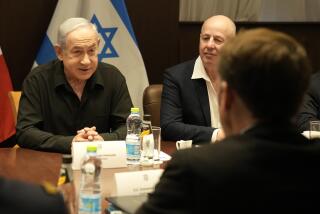Somali Leader Follows Crisis From Afar : Africa: Prime minister has lobbied the world for support from his refuge in a Saudi palace.
- Share via
RIYADH, Saudi Arabia — At this desert way station for governments that have lost their way, Somalia’s prime minister, Umar Arteh Ghalib, waits in a marbled Arab palace for the phone call that will summon him back to the hell he calls home.
It is the same palace where Kuwaiti Emir Jabbar al Ahmed al Sabah cooled his heels for several days after his desperate flight from the Iraqis in Kuwait city. Deposed Ugandan dictator Idi Amin sought refuge here from his enemies a few miles across the Saudi Desert to the west.
“I imagine myself like the captain of a ship in disaster asking for SOS, with the passengers in the ship saying, ‘Don’t save us.’ That’s it. Helpless! What’s happening now is what I was asking for six months ago,” Arteh Ghalib said Monday as thousands of American troops and other international forces prepared to land in Somalia, hundreds of miles away across the desert and the Red Sea.
Arteh Ghalib, prime minister of an interim Somali government that does not have international recognition, has waited for much of the past 15 months with his foreign minister, defense minister, health minister and higher education minister in the empty halls of Riyadh’s main conference palace, hoping to win support for the struggling homeland from exile.
“I’ve been in this embarrassing situation,” said the elegantly spoken, British-educated Arteh Ghalib, whose warlord president, Ali Mahdi Mohamed, remains in the Somali capital, Mogadishu. “But I did not sit idly. I did what I could do outside Somalia, like (Cambodian) Prince Sihanouk, or the leaders of Lebanon, or during the Kuwait crisis, Sheik Jabbar, who was staying in the same palace where I’m staying.”
Arteh Ghalib has helped win recognition for his interim government--whose Somalian domain barely extends through northern Mogadishu--from the Organization of African Unity, the Arab League, the Nonaligned Movement and the Organization of the Islamic Conference; he has not, however, been persuasive with the United Nations and much of the world, which simply presumes warring, starving Somalia has no government.
Mahdi and Arteh Ghalib were chosen to head a new interim government by six major armed Somali fronts meeting in Djibouti in July, 1991, six months after the toppling of the former president, Maj. Gen. Mohamed Siad Barre.
Arteh Ghalib, who had served as Siad Barre’s foreign minister and higher education minister before falling from grace and spending six years in prison, left the country for medical treatment in Saudi Arabia shortly after the new government attempted to take power.
He had just left the hospital when a large militia still hostile to the new government--the United Somali Congress of Gen. Mohamed Farah Aidid, which had captured Mogadishu and toppled Siad Barre--launched an attack against the presidential palace Oct. 28, 1991, reducing the capital to further ruins in the ensuing fighting.
Who was in charge at that point? Go figure. The way the world saw it, not much of anybody was. But Arteh Ghalib, who decided to stay in Riyadh and summon three other ministers from Nairobi, said he has a central government ready to step in, once the international forces disarm the warlords and restore order.
“They are trying to bury the legitimate government alive. But it’s there. The president is there, 98% of the ministers are there, the only obstacles in our way are those armed bandits marauding around there. We are ready to help our people,” said the 57-year-old official, treated as a guest of the Saudi government along with his two sons, two daughters and his wife.
Arteh Ghalib communicates with the president, and, by implication, his 68 fellow ministers, by way of a single satellite telephone line connected to the presidential office in Mogadishu. Sometimes, he says, friends drive from his hometown of Hargeysa in northern Somalia to neighboring Djibouti to phone in a message. He sends faxes to international agencies on the dashing letterhead of “The Somali Republic, Office of the Prime Minister, Mogadishu.”
Much of the time, he spends on the telephone or attending conferences and meetings, seeking international aid and intervention in Somalia. Now, he feels, that help has come.
“It’s a welcome step, but of course it’s too late when 300,000 people fell victims to this senseless war,” he said. “We don’t see them (U.S. forces) as invaders, we see them as our allies, as was the case here in Saudi Arabia with the allied troops. We want to assure the parents of these young men who have come from thousands of miles away to help us that in the same way they want to save our people, we want to save their people.”
Arteh Ghalib said his government is urging the international forces to establish an arms purchasing program to woo guns away from a weapons-wielding public. The government is asking troops to remain until there is full disarmament, humanitarian assistance programs are in place and a reliable security service has been established to keep the peace.
“When they make sure that all these steps have been taken, then they can go,” he said.
More to Read
Sign up for Essential California
The most important California stories and recommendations in your inbox every morning.
You may occasionally receive promotional content from the Los Angeles Times.













